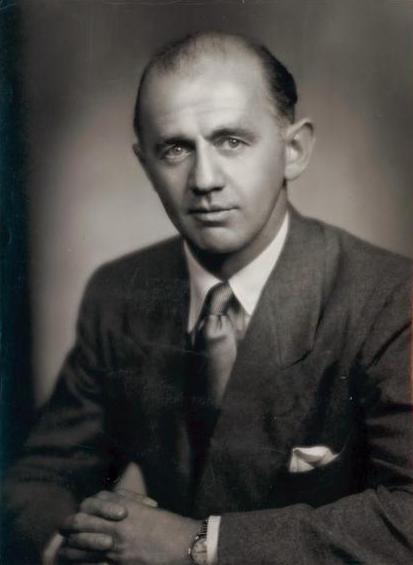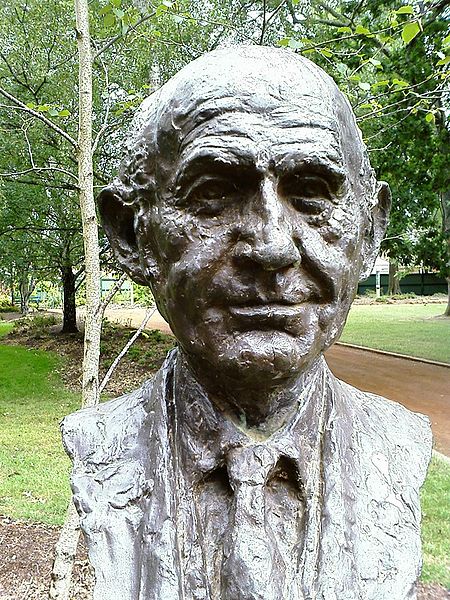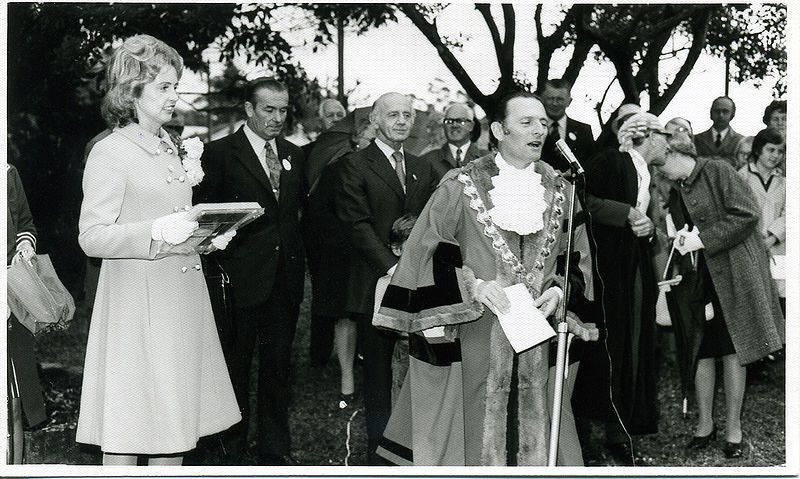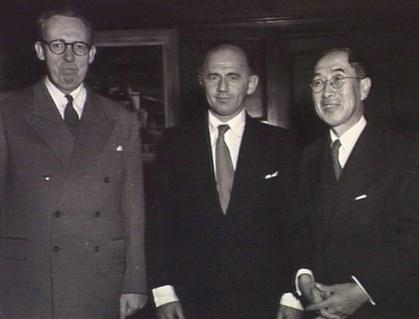<Back to Index>
- Philosopher Karl Robert Eduard von Hartmann, 1842
- Painter and Sculptor George Frederic Watts, 1817
- Prime Minister of Australia William "Billy" McMahon, 1908
PAGE SPONSOR


Sir William "Billy" McMahon, GCMG, CH (23 February 1908 – 31 March 1988) was an Australian Liberal politician and the 20th Prime Minister of Australia. He was the longest continuously serving government minister in Australian history (21 years and 6 months).
McMahon was born in Sydney, New South Wales, where his father was a lawyer. He was of Irish ancestry. McMahon's mother died when he was 9 and his father when he was 18. He was educated at Sydney Grammar School and at the University of Sydney, where he graduated in law. He practised in Sydney with Allen, Allen & Hemsley (now Allens Arthur Robinson), the oldest law firm in Australia. In 1940 he joined the Army, but because of a hearing loss he was confined to staff work. After World War II he travelled in Europe and completed an economics degree.
McMahon was elected to the House of Representatives for the Sydney seat of Lowe in 1949, one of the flood of new Liberal MPs known as the "forty-niners". He was capable and ambitious, and in 1951 Prime Minister Robert Menzies made him Minister for Air and Minister for the Navy. Over the next 15 years he held the portfolios of Social Services, Primary Industry and Labour and National Service, and he was also Vice-President of the Executive Council. In 1966, when Harold Holt became Prime Minister, McMahon succeeded him as Treasurer and as Deputy Leader of the Liberal Party.
Despite his steady advance, McMahon remained unpopular with his colleagues. He was highly capable, but seen as too ambitious and a schemer. He had never married, and there were frequent rumours throughout his life that he was homosexual. In 1965, aged 57, he married Sonia Rachel Hopkins, who was then aged 32. They had three children: Melinda, Julian (who would find fame as a model and an actor), and Deborah.
When Holt drowned in December 1967, McMahon was assumed to be his automatic successor. But John McEwen, interim Prime Minister and leader of the Country Party, announced that he and his party would not serve in a government led by McMahon. McEwen did not state his reasons publicly, but privately he told McMahon he did not trust him. There was also McEwen's personal dislike of McMahon due to his perceived homosexuality. McEwen, an arch-protectionist, also correctly suspected that McMahon favoured policies of free trade and deregulation.
McMahon therefore withdrew, and John Gorton won the party room ballot. McMahon became Foreign Minister and
waited for his chance at a comeback. He stood as a candidate for the
Liberal Party leadership (and therefore Prime Minister, as the
Liberal/Country Party coalition held a majority in the House of
Representatives) after the1969 election but was defeated by Gorton. In January 1971 McEwen retired as Country Party leader and his successor, Doug Anthony, did not continue the veto against McMahon. In March 1971 the Defence Minister, Malcolm Fraser,
resigned from Cabinet and denounced Gorton, who then called a party
meeting. When the party room vote on a motion of no confidence was
tied, Gorton declared that he lacked the confidence of the room and
relinquished the leadership, and McMahon was elected leader. McMahon found being Prime Minister an unenjoyable experience. TheVietnam War and conscription had become very unpopular. He was unable to match the performance of Labor leader Gough Whitlam,
who campaigned on radical new policies such as universal health
insurance. He was undermined by plotting from Gorton's supporters. He
attacked Whitlam over his policy of recognising the People's Republic of China, then had to back down when President Nixon announced his visit to China. His
reputation for economic management was undermined by high inflation.
His voice and appearance came across badly on television, and he was no
match in parliamentary debates for Whitlam, a witty and powerful orator. McMahon lost his nerve, and in the December 1972 election campaign
he was outperformed by Whitlam and subjected to further humiliation in
the press. When Whitlam won the election McMahon resigned the Liberal
leadership. He had been a minister continuously for 21 years and 6 months, a record in the Australian Parliament. Only Sir George Pearce and John McEwen had longer overall ministerial service, but their terms were not continuous. McMahon served in the Shadow Cabinet under his successor Billy Snedden, but was dropped after the 1974 election. He retained his seat in parliament in the 1975, 1977 and 1980 elections, and is the last former Australian Prime Minister to recontest his seat. He became Joint Father of the House of Representatives with Clyde Cameron in 1977, and sole Father in 1980 when Cameron retired. On the retirement of Senator Justin O'Byrne in 1981, he became Father of the Parliament. He resigned from parliament in 1982. Sir William McMahon died of cancer in Sydney on 31 March 1988, aged 80. His widow Lady (Sonia) McMahon died aged 77 on 2 April 2010. William McMahon was appointed a Privy Counsellor in 1966, a Companion of Honour in the New Years Day Honours of 1972 and Knight Grand Cross of the Order of St Michael and St George in the Queen's Birthday Honours of 1977. Following the 2009 redistribution of New South Wales, the Division of Prospect will be renamed the Division of McMahon in his honour. The renaming will take effect at the Next Australian federal election.

